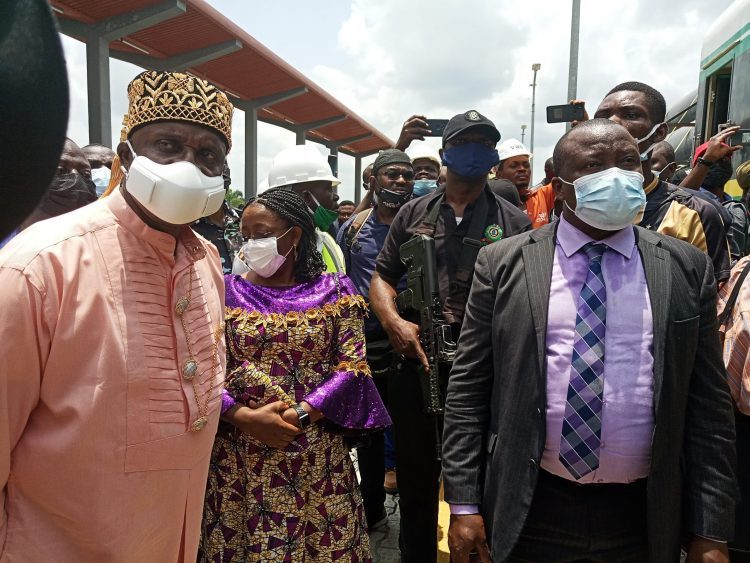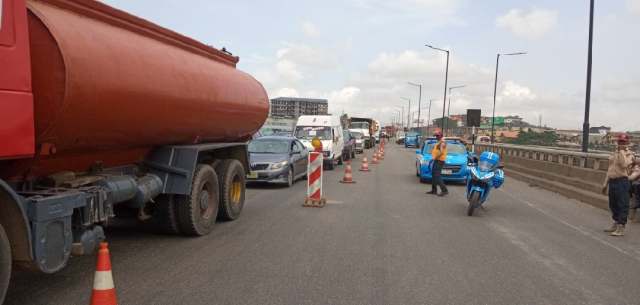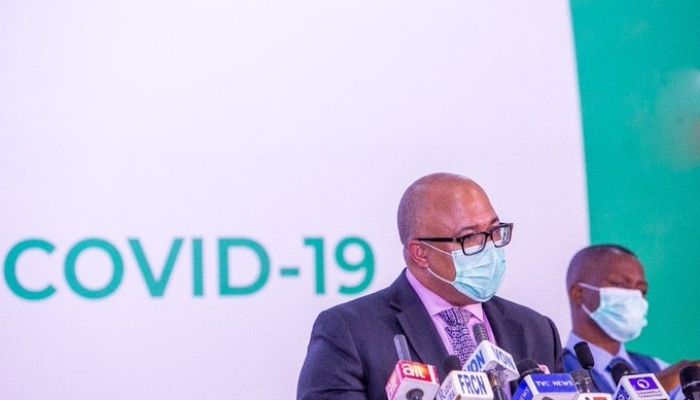Economy
2021 budget: Expert tasks FG on monitoring, evaluation for enhanced performance
A financial expert, Dr Glenn Prince-Abbi, on Monday urged the Federal Government to map out strategies for proper monitoring and evaluation of national budget to ensure enhanced performance.

Prince-Abbi, the Chief Executive Officer (CEO) of Espera Global Corporation, said this in an interview with the News Agency of Nigeria (NAN) in Lagos, while reacting to 2021 budget proposal.
He said that government should put in place tough monitoring and evaluation mechanisms to ensure budget performance.
He noted that previous budget performance assessments had not been impressive.
Prince-Abbi added that government needed to apply more drastic measures to prevent a repeat of past experiences in the 2021 fiscal year.
He said that revenue generating agencies must be compelled to perform optimally on their revenue target deliverables.
“Over the years, taking for instance 2015 to 2020, performances on both oil revenue and non-oil revenue projections have shown disturbing disparities.
“I think we need to put in place measures, strategic and operational frameworks which can help to bridge the gap and stem the persisting dissonance between budget making and budget performance.
“The Federal Government needs to apply more drastic measures to prevent this in the 2021 fiscal year.
“Also, revenue generating agencies must be compelled to perform optimally on their revenue deliverables. These are no times for business-as- usual,” Prince-Abbi said.
He also called on government to contain recurrent expenditure and increase budgetary allocation to capital expenditure to accelerate economic growth.
“Recurrent expenditure must be put on progressive containment in order to release the much needed revenues to address capital expenditure in priority areas.
“This will strengthen macroeconomic resilience while building and accelerating economic growth.
“One of the fundamental draw-backs in Nigerian government budget making is in the area of capital expenditure share of the budget.
“In the first budget, namely the 2016 budget prepared by the President Muhammadu Buhari-led administration, bold actions were taken to strengthen the percentage of capital expenditure (CAPEX).
“CAPEX represented 30 per cent of the total budget. The President promised to continue to raise the percentage allocation for capital expenditure in future years.
“The government kept this promise, though very modestly. For instance, capital expenditure plan for 2017 was 30.7 per cent and 2018 was 30.8 per cent.
“However, in the 2019 budget, capital expenditure plan fell back to 30 per cent and in 2020 it fell further to 24 per cent, and now in the proposed 2021 budget, it is 29 per cent.
“While being an improvement on the CAPEX spend of 2020, it is still a poor showing as far as the need for better quality aggregate spending is concerned,” Prince-Abbi said.
He said that government should take deliberate measures and unrelenting steps in improving capital expenditure ratios and desist from pandering to the political expediencies of rising recurrent expenditure.
“With a strategy to move much-needed revenues to the capital expenditure side, government should come down heavily on all existing and potential areas which sadly drive unwholesome acceleration in recurrent expenditure,” he added.
NAN reports that the Federal Executive Council recently approved N13.08 trillion budget proposal for 2021 fiscal year.
The Minister of Finance, Budget and National Planning, Mrs Zainab Ahmed, said the budget estimate was made up of N2.083 trillion capital expenditure, which she described as 29 per cent of the total budget.
According to her, the budget proposal is predicated on N379/$ exchange rate, oil benchmark of $40 per barrel, oil production volume of 1.86 million barrels per day, including 400,000 condensate, Gross Domestic Product (GDP) growth of three per cent and 11.95 per cent inflation rate. (NAN)
Economy
JUST IN: FG Halts Planned 15% Import Duty on Petrol, Diesel

By: Fabian Apechihin
The Federal Government has suspended the planned implementation of a 15 percent import duty on petrol and diesel.
This was disclosed on Thursday by George Ene-Ita, Director of Public Affairs at the Nigerian Midstream and Downstream Petroleum Regulatory Authority (NMDPRA), who urged Nigerians to avoid panic buying.
President Bola Tinubu had earlier, on October 29, approved the imposition of the tariff following a proposal by the Executive Chairman of the Federal Inland Revenue Service (FIRS), Zacch Adedeji. The approval, conveyed in a letter signed by the President’s Private Secretary, Damilotun Aderemi, was intended to take effect from November 21, 2025.
The proposed policy sought to impose a 15 percent duty on the cost, insurance, and freight (CIF) value of imported petrol and diesel. It was aimed at supporting domestic refineries — such as the Dangote Refinery and modular plants — by making imported fuel less competitive. However, experts cautioned that the move could lead to an increase of up to ₦150 per litre in pump prices and further fuel inflation and transportation costs.
In its latest update, the NMDPRA confirmed that the import duty is no longer under consideration.
“It should also be noted that the implementation of the 15% ad-valorem import duty on imported Premium Motor Spirit (PMS) and Automotive Gas Oil (Diesel) is no longer in view,” the Authority stated.
The agency further assured the public of adequate fuel availability across the country, noting that national stock levels remain within the required sufficiency threshold.
“There is a robust domestic supply of petroleum products — including PMS, AGO, and LPG — from both local refineries and imports, ensuring timely replenishment of depots and retail stations,” the statement added.
NMDPRA cautioned marketers against hoarding, panic buying, or arbitrary price increases, emphasizing that it will continue to monitor the market to prevent any disruption in supply.
“While appreciating the efforts of stakeholders in maintaining smooth and uninterrupted supply, the public is assured of NMDPRA’s commitment to safeguarding national energy security,” the statement concluded.
Economy
FGN, Sign $400m Deal To Boost Local Steel Production

From Hassan Taiye
The Federal Government of Nigeria, FGN, through the Ministry of Steel Development, has signed a Joint Strategic Cooperation Declaration with Stellar Steel Company Limited.
Stellar Steel Company Limited is a steel-manufacturing enterprise established to operate in Nigeria, with major investment backing from Chinese parent groups: Galaxy Group and RSIN Group based in Fuzhou, Fujian Province, China.
The company has committed approximately US$450 million for a steel plant project in Ogun State, Nigeria, scheduled to begin operations by mid-2026.
This landmark partnership is aimed at revitalising Nigeria’s steel industry and reducing the nation’s dependence on imported steel products, according to a statement signed by the the Principal Information Officer, PIO, Ijomah Opia, for the director, Information and Public Relations in the ministry.
The agreement, signed in Abuja, on Tuesday 28th October, 2025 will see Stellar Steel invest $400 million in the construction of a modern Steel Plant in Ewekoro, Ogun State. The project will be developed in three phases, with the first phase expected to begin production by 2026.
The Minister of Steel Development Prince Shuaibu Abubakar Audu signed the agreement when he hosted Mr Li, President of Inner Galaxy Group and other members of the Stellar Steel Company Limited in the Ministry’s Headquarters in Abuja.
According to Prince Audu, the collaboration aligns with the federal government’s goal of achieving 10 million tonnes of crude steel production per annum by 2030, a major step toward industrial self-reliance and economic diversification.
The minister further stated that the Federal Ministry of Steel Development would facilitate policy and infrastructure support, including inclusion of Stellar Steel’s logistics projects in the National Infrastructure Plan and access to available fiscal incentives.
Highlights of the cooperation includes the followings:
1.Development of a localised iron ore supply chain to reduce import dependence and save over $1 billion in foreign exchange annually.
- Creation of more than 2,000 direct and 20,000 indirect jobs across the steel value chain.
- Promotion of green steel production using clean and energy-efficient technologies.
- Strengthening of Nigeria’s position as a regional steel manufacturing hub in West Africa.
Audi also said that in return, Stellar Steel would prioritise local recruitment and training, partnering with Nigerian universities to build technical and managerial expertise in steel production.
Prince Shuaibu emphasised that this strategic cooperation marks a new era for Nigeria’s steel industry and demonstrates the government’s commitment to sustainable industrial growth and economic transformation.
In his remarks the leader of the delegation, Mr Li assured the minister that Stellar Steel would respect all agreements reached and would ensure the completion of the project in record time and assured that all safety standards will be observed.
Mr Li was accompanied during the visit by Mr You Xiastian, Vice Chairman of RSIN Group, Mr Jackie Den, Vice President of Inner Galaxy Group and Mr Yin, Director of RSIN Group.
He recalled that the Minister of Steel Development, Prince Audu, performed the groundbreaking ceremony of the Steel Plant in Ogun State sometime in April, 2025.
Speaking at the signing, representatives of both parties emphasised that the partnership would strengthen Nigeria’s industrial base, create jobs, and foster technology transfer in the sector.
Economy
EU Delegation Strengthens Ties with Nigerian Senate
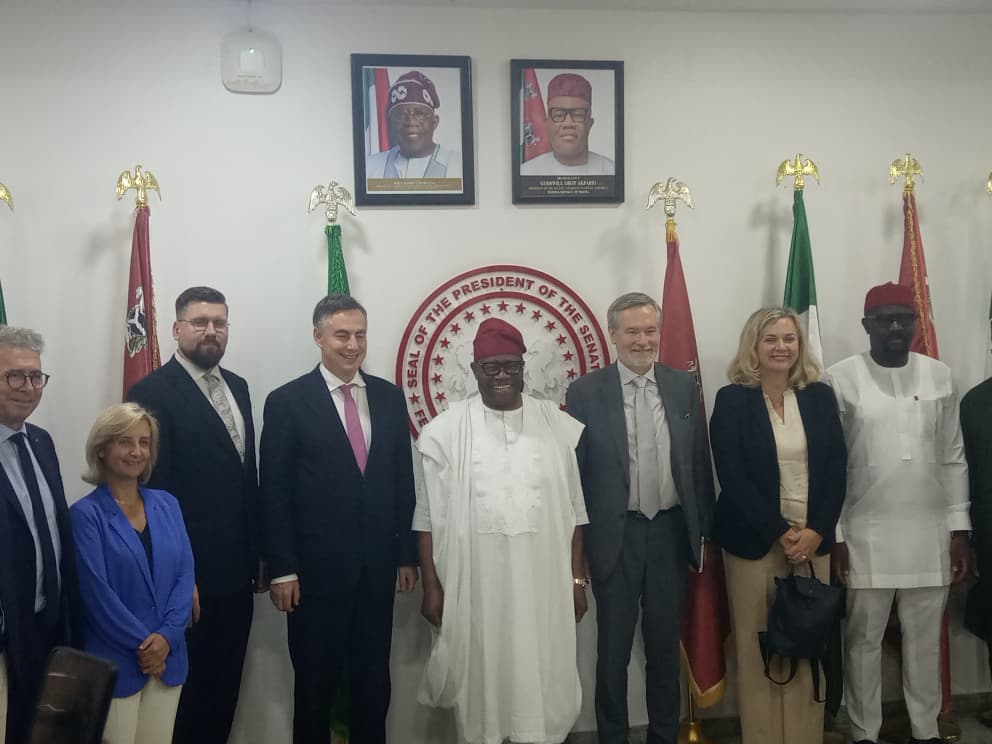
From Hassan Taiye
A high-level delegation from the European Union (EU) Parliament’s Foreign Affairs Committee, led by Mr. David McAllister, paid a courtesy visit to the Nigerian Senate today October 28, 2025.
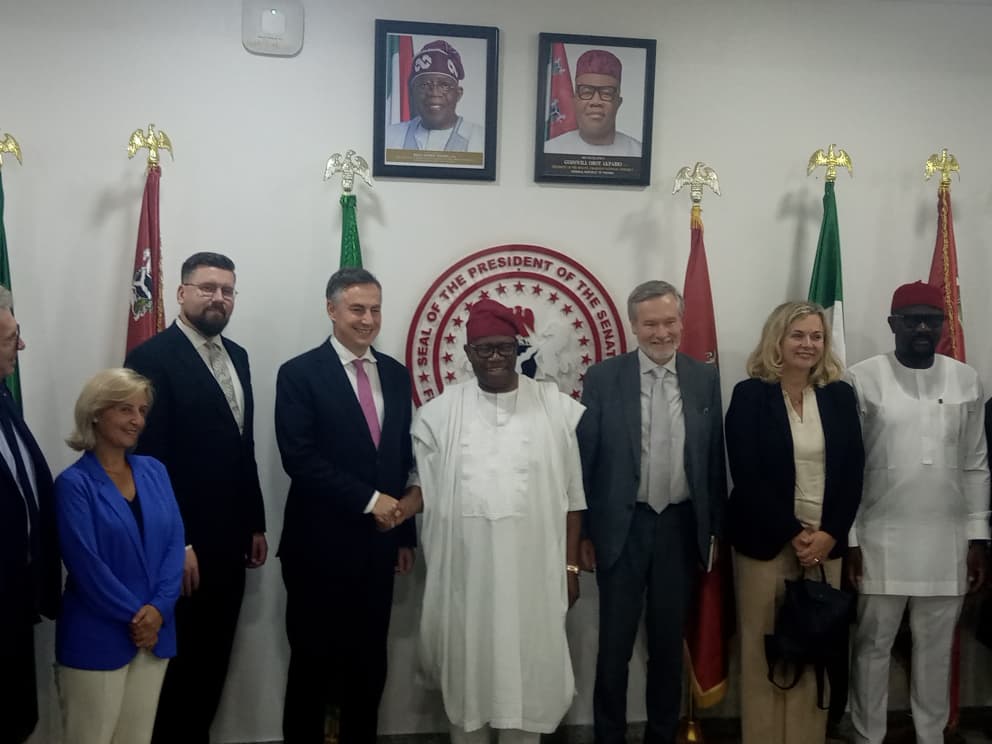
“We are here to deepen our understanding of the situation in West Africa and strengthen our partnership with Nigeria,” McAllister said.
Senate President Godswill Akpabio welcomed the delegation, emphasizing Nigeria’s strategic partnership with the EU. “Nigeria is committed to strengthening ties with the EU, highlighting areas of mutual interest, including security, trade, and governance,” Akpabio said.
The delegation, comprising Ambassador Greta Mylott, EU Ambassador to Nigeria and ECOWAS, Miss Zelaya Zorko, Miss Mata Tamido, Sebastian Tankman, General Christophe Gomart, and Sebastian Buharo, is undertaking a comprehensive tour of West Africa, with stops in Nigeria and Ghana.
During the visit, Akpabio shed light on the challenges facing female representation in Nigeria’s parliament. “Women often vote for male candidates, making it difficult for female candidates to win elections,” he noted.
“The Senate is exploring innovative solutions, including constitutional amendments, to boost female participation in the legislative process, with support from organizations like the Black Women’s Forum.”
The EU delegation’s visit aims to foster greater understanding and cooperation between the EU and Nigeria, addressing shared concerns, such as terrorism, climate change, and economic development.
“The EU is committed to supporting Nigeria’s development efforts,” McAllister assured the Senate, emphasizing the bloc’s interest in seeing a stable, prosperous, and democratic Nigeria.
Their visit also includes participation in the forthcoming International Islamic Conference on Security and Governance in West Africa and the Sahel, scheduled for November 4-6, 2025 at ECOWAS Commission.
Akpabio expressed optimism about the potential for enhanced cooperation, highlighting Nigeria’s readiness to work with the EU to address common challenges.
-

 Uncategorized5 years ago
Uncategorized5 years agoFG, states urged to harness flooding for ranching, others with technology – Agbaje
-

 Headlines10 years ago
Headlines10 years agoBreaking: EFCC seals Borno House of Assembly, as Hon members take to their heels
-

 News12 years ago
News12 years agoNigeria Security Operatives Stage Manhunt For Homosexual Perpetrator
-

 News9 years ago
News9 years agoHow 21-year-old Girl fled community over accusation of lesbianism
-

 News10 years ago
News10 years agoYobe Gov Moves Against Deputy
-

 Opinion7 years ago
Opinion7 years ago7 signs she has friend zoned you
-
Technology4 years ago
Online job placement company headhunts women
-

 Headlines10 years ago
Headlines10 years agoBorno Dep Gov Abducts Another Church Leader

